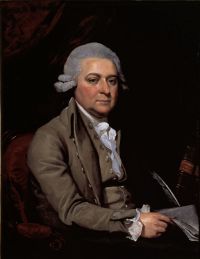John Adams (Painting)
Artist/Maker: Mather Brown (1761-1831); copied by Bradley Stevens
Created: 1788
Origin/Purchase: England
Materials: oil on canvas
Dimensions: 90.2 × 71.3 (35 1/2 × 28 1/16 in.)
Location: Parlor
Provenance: Thomas Jefferson; by sale to an unidentified buyer at the Harding Gallery sale in 1833; by descent to George Francis Parkman; by bequest to the Boston Athenaeum in 1908; copy produced for the Thomas Jefferson Foundation in 1996
Accession Number: 1996-6
Historical Notes: One of the more promising students of Benjamin West in London was Mather Brown, a young American who was active in London for a period of time after 1781. Born in Massachusetts, he was an early pupil of Gilbert Stuart. By 1785 Brown's popularity in London was such that he attracted the patronage of John and Abigail Adams.[1] Their daughter, Abigail, wrote her brother:
A rage of Painting has taken Possession of the Whole family, one of our rooms has been occupied by a Gentleman of this profession, for nearly a fortnight, and we have the extreme felicity of looking at ourselves upon Canvass.[2]
Jefferson visited England in the spring of 1786. He not only sat for Brown for a portrait for John and Abigail Adams but also must have seen Brown's likeness of Adams (1785). Once Jefferson returned to Paris, he asked William Stephens Smith, Adams's son-in-law, to obtain a portrait of Adams.
Will you undertake to prevail on Mr. Adams to set for his picture and on Mr. Brown to draw it for me? I wish to add it to those of other principal American characters which I have or shall have: and I had rather it should be original than a copy.[3]
More than a year later, Jefferson still had no picture. Mrs. Adams told him: "Mr. Adams will write you. He has not a portrait that he likes to send you. Mr. Trumble talks of taking one. If he succeeds better than his Brethren, Mr. Adams will ask your acceptance of it."[4]
Although Jefferson later was enthusiastic about John Trumbull's abilities as a painter, he thought that he was not equal to the task of taking Adams's portrait. Jefferson informed Smith:
With respect to Mr. Adams's picture, I must again press it to be done by Brown, because Trumbul does not paint of the size of the life, and could not be asked to hazard himself on it. I have sent to Florence for those of Columbus (if it exists) of Americus Vesputius, Magellan &c. and I must not be disappointed of Mr. Adams's. [5]
Realizing that Adams would soon return to America, Jefferson pressed hard to secure Adams's portrait before his departure. In March 1788, Trumbull at last reported that the portrait was under way: "Brown is busy about the pictures. Mr. Adams's is like. Your's I do not think so well of."[6]
Jefferson finally received both portraits, together with a "polyplasiasmos" and a picture of George Washington for the Marquis de Lafayette, in late August or early September of 1788.[7] In Brown's portrait of Adams, probably at Adams's suggestion, the artist showed Jefferson's Notes on the State of Virginia, which Jefferson had sent to his friend in 1785. Adams told him that the book "is our Meditation all the Day long. ... I think it will do its Author and his country great Honour."[8]
- Text from Stein, Worlds, 126
References
- ^ For detailed accounts, see David Meschutt, "The Adams-Jefferson Portrait Exchange," American Art Journal vol. 14, no. 2 (1982): 47-54, and Andrew Oliver, Portraits of John and Abigail Adams (Cambridge: Belknap Press of Harvard University Press, 1967), 46-54.
- ^ Abigail Adams to John Quincy Adams, July 4-August 11, 1785, Adams Family Papers, Massachusetts Historical Society.
- ^ Jefferson to Smith, October 22, 1786, in PTJ, 10:479. Transcription available at Founders Online.
- ^ Abigail Adams to Jefferson, July 10, 1787, in PTJ, 11:573. Transcription available at Founders Online.
- ^ Jefferson to Smith, February 2, 1788, in PTJ, 12:558. Transcription available at Founders Online.
- ^ Trumbull to Jefferson, March 6, 1788, in PTJ, 12:647. Transcription available at Founders Online.
- ^ Polyplasiasmos was a method of copying pictures in oil paint by a mechanical or chemical process, invented by Joseph Brook. The picture referred to here may have been a polyplasiasmos of Benjamin West's The Prodigal Son (1771), which was available for sale in the Polygraphic Society in the Strand in 1788. See Helmut von Erffa and Allen Staley, The Paintings of Benjamin West (New Haven: Yale University Press, 1986), 339.
- ^ John Adams to Jefferson, May 22, 1785, in PTJ, 8:160. Transcription available at Founders Online.
